- লিঙ্ক পান
- X
- ইমেল
- অন্যান্য অ্যাপ
Doctors are clueless about what really happens in the beds, rooms, and halls of our hospitals. That's why we went to the experts: nurses.
This is what I mean when I say to get a second opinion
 ISTOCK/MONKEYBUSINESSIMAGES
ISTOCK/MONKEYBUSINESSIMAGES
"We're not going to tell you your doctor is incompetent, but if I say, 'You have the right to a second opinion,' that can be code for 'I don't like your doctor' or 'I don't trust your doctor.'"—Linda Bell, RN, clinical practice specialist at the American Association of Critical-Care Nurses in Aliso Viejo, California Here's how to find a doctor you trust.
Before you gossip...
 ISTOCK/MONKEYBUSINESSIMAGES
ISTOCK/MONKEYBUSINESSIMAGES
“Feel free to tell us about your personal life, but know that we’re here for 12 hours with nothing to talk about. So the stuff you tell us will probably get repeated.” —A nurse in St. Petersburg, Florida
Sometimes we give more medication than we're ordered to
 ISTOCK/FOTOGRAFIABASICA
ISTOCK/FOTOGRAFIABASICA
"When a patient is terminally ill, sometimes the doctor won't order enough pain medication. If the patient is suffering, we'll sometimes give more than what the doctor said and ask him later to change the order. People will probably howl now that I've said it out loud, but you have to take care of your patient." —A longtime nurse in Texas
A lot of my patients are incontinent
 YEVHEN-PROZHYRKO/SHUTTERSTOCK
YEVHEN-PROZHYRKO/SHUTTERSTOCK
"I’m supposed to just use a wet washcloth to clean them. But if it's a patient who’s been really nice and appreciative, I’ll go all the way to intensive care to get some of the heated wet wipes, which are a lot more gentle. Somebody who's constantly yelling at me? I just use the washcloth." —A nurse in St. Petersburg, Florida
I always remain calm
 ISTOCK/ABEL MITJA VARELA
ISTOCK/ABEL MITJA VARELA
"I've had people blow out arteries in front of me, where I know the patient could bleed to death within minutes. I've had people with brains literally coming out of their head. No matter how worried I am, I'll say calmly, 'Hmmm, let me give the doctor a call and have him come look at that.'" —A longtime nurse in Texas. These are the craziest things ER nurses have ever seen.
Yes, you were stupid not to come in earlier
 ISTOCK/MONKEYBUSINESSIMAGES
ISTOCK/MONKEYBUSINESSIMAGES
"I'd never tell a patient that he's a moron for waiting a week for his stroke symptoms to improve before coming to the hospital. Although I'd like to. Especially if his wife then complains that we’re not doing anything for the guy." —A longtime nurse who blogs at head-nurse.blogspot.com
Don't lie about your pain
 ISTOCK/MONKEYBUSINESSIMAGES
ISTOCK/MONKEYBUSINESSIMAGES
"If you're happily texting and laughing with your friends until the second you spot me walking into your room, I'm not going to believe that your pain is a ten out of ten." —A nurse in New York City. Here are some more things doctors and nurses wish patients wouldn't do.
Your life is in our hands—literally
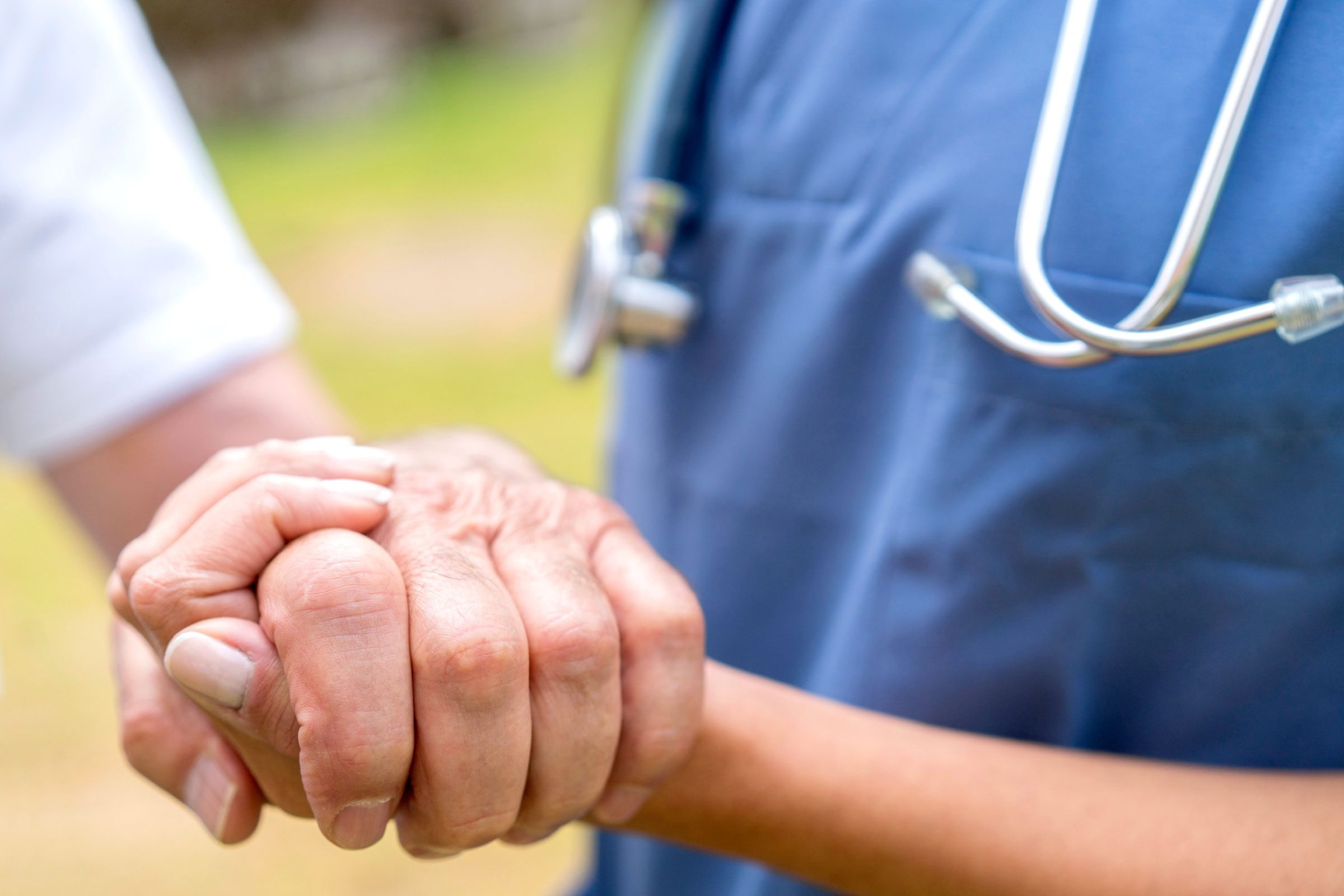 ISTOCK/ANDRESR
ISTOCK/ANDRESR
"We question physicians' orders more often than you might think. Some of the mistakes I've headed off: a physician who forgot to order a medication that the patient was taking at home, a doctor who ordered the incorrect diet for a diabetic, and one who tried to perform a treatment on the wrong patient." —A nurse from Pennsylvania
People have no idea of the amount of red tape we have to deal with every day
 ISTOCK/STURTI
ISTOCK/STURTI
"We spend hours at the computer just clicking boxes. They tell us, 'If it wasn’t charted, it didn’t happen.' So I always chart with a jury in the back of my mind." —An intensive-care nurse in California
Hospitals are full of drug-resistant germs
 ISTOCK/COURTNEY KEATING
ISTOCK/COURTNEY KEATING
"Despite nurses' best efforts, hospitals are still filthy and full of drug-resistant germs. I don't even bring my shoes into the house when I get home." —Gina, a nurse who blogs at codeblog.com
These days, you can’t get admitted unless you’re really sick
 ISTOCK/DRPNNCPP
ISTOCK/DRPNNCPP
"And you'll probably get sent home before you're really ready. So we don't get any easy ones anymore." —Kathy Stephens Williams, RN, staff development educator for critical care at St. Anthony's Medical Center in St. Louis, Missouri. Here are some doctor-approved tips to shorten your hospital stay.
The No. 1 thing you should never say to me:
 ISTOCK/AETB
ISTOCK/AETB
"'You’re too smart to be a nurse.' I went to nursing school because I wanted to be a nurse, not because I wanted to be a doctor and didn’t make it." —A longtime nurse in Texas
The sicker you are, the less you complain
 ISTOCK/XAVIER ARNAU
ISTOCK/XAVIER ARNAU
"I'll have a dying patient with horrible chest pain who says nothing, because he doesn't want to bother me. But the guy with the infected toe—he can't leave me alone." —An intensive-care nurse in California
I'll always come into your room with a smile
 ISTOCK/MONKEYBUSINESSIMAGES
ISTOCK/MONKEYBUSINESSIMAGES
"No matter how many times you use your call light, even if it's every ten minutes, I will come into your room with a smile. However, if you don't really need help, I will go back to the nurses' station and complain, and this may affect how the nurses on the next shift take care of you." —A cardiac nurse in San Jose, California. Check out these heartwarming stories about nurses who went above and beyond.
Over-the-counter drugs and herbals count as medications you take
 ISTOCK/LS9907
ISTOCK/LS9907
"When your provider asks for a list of the medications you're taking, make sure you include over-the-counter drugs and herbals. People think that if an herb is 'all natural' and 'organic,' it's not a medication. But that's not true. Herbals can interact with other medications and can cause serious complications." —Kristin Baird, RN, a health-care consultant in Fort Atkinson, Wisconsin
'Grey’s Anatomy'? We watch it and laugh
 ISTOCK/HONGQI ZHANG
ISTOCK/HONGQI ZHANG
"Ninety percent of the things doctors do on the show are things that nurses do in real life. Plus, there’s no time to sit in patients' rooms like that." —Kathy Stephens Williams, RN
This is a hospital, not a hotel
 ISTOCK/PANCO971
ISTOCK/PANCO971
“I’m sorry the food isn't the best, and no, your boyfriend can't sleep in the bed with you." —A nurse in New York City. Learn the secrets hospitals won't tell you.
I'll wait for the doctor to tell you about test results
 ISTOCK/CATHY YEULET
ISTOCK/CATHY YEULET
"If you ask me if your biopsy results have come back yet, I may say no even if they have, because the doctor is really the best person to tell you. He can answer all your questions."—Gina, a nurse who blogs at codeblog.com
Nurses can be mean to each other
 ISTOCK/BRAUNS
ISTOCK/BRAUNS
"In my first nursing job, some of the more senior nurses on the floor refused to help me when I really needed it, and they corrected my inevitable mistakes loudly and in public. It's a very stressful job, so we take it out on each other." —Theresa Brown, RN, an oncology nurse and the author of Critical Care: A New Nurse Faces Death, Life, and Everything in Between
It's stressful when a physician makes a mistake
 ISTOCK/STA-GUR KARLSSON
ISTOCK/STA-GUR KARLSSON
"It can be intimidating when you see a physician who is known for being a real ogre make a mistake. Yes, you want to protect your patient, but there's always a worry: Am I asking for a verbal slap in the face?" —Linda Bell, RN. Learn what happens when doctors make life-threatening mistakes.
I hate being blamed for things that aren't my fault
 ISTOCK/KATARZYNABIALASIEWICZ
ISTOCK/KATARZYNABIALASIEWICZ
"Every nurse has had a doctor blame her in front of a patient for something that is not her fault. They're basically telling the patient, 'You can't trust your nurse.'" —Theresa Brown, RN
A positive note from you can go a long way
 ISTOCK/JOSHUA HODGE PHOTOGRAPHY
ISTOCK/JOSHUA HODGE PHOTOGRAPHY
"If you have a really great nurse, a note to her nurse manager that says 'So-and-so was exceptional for this reason' will go a long way. Those things come out in her evaluation—it's huge.” —Linda Bell, RN
I love when you come back and visit
 ISTOCK/JOSHUA HODGE PHOTOGRAPHY
ISTOCK/JOSHUA HODGE PHOTOGRAPHY
"If you've been a patient in a unit for a long time, come back and visit. We'll remember you, and we'd love to see you healthy." —An intensive-care nurse in California
We still believe in miracles
 ISTOCK/ABEL MITJA VARELA
ISTOCK/ABEL MITJA VARELA
"I once took care of a child who had been in a coma for more than a week. The odds that he would wake up were declining, but I had read that the sense of smell was the last thing to go. So I told his mom, 'Put your perfume on a diaper and hold it up by his nose to see if it will trigger something.' The child woke up three hours later. It was probably a coincidence, but it was one of my best moments as a nurse." —Barbara Dehn, RN, a nurse-practitioner in Silicon Valley who blogs at nursebarb.com. Read more stories of miraculous recoveries from nurses and doctors.
Nursing is incredibly demanding
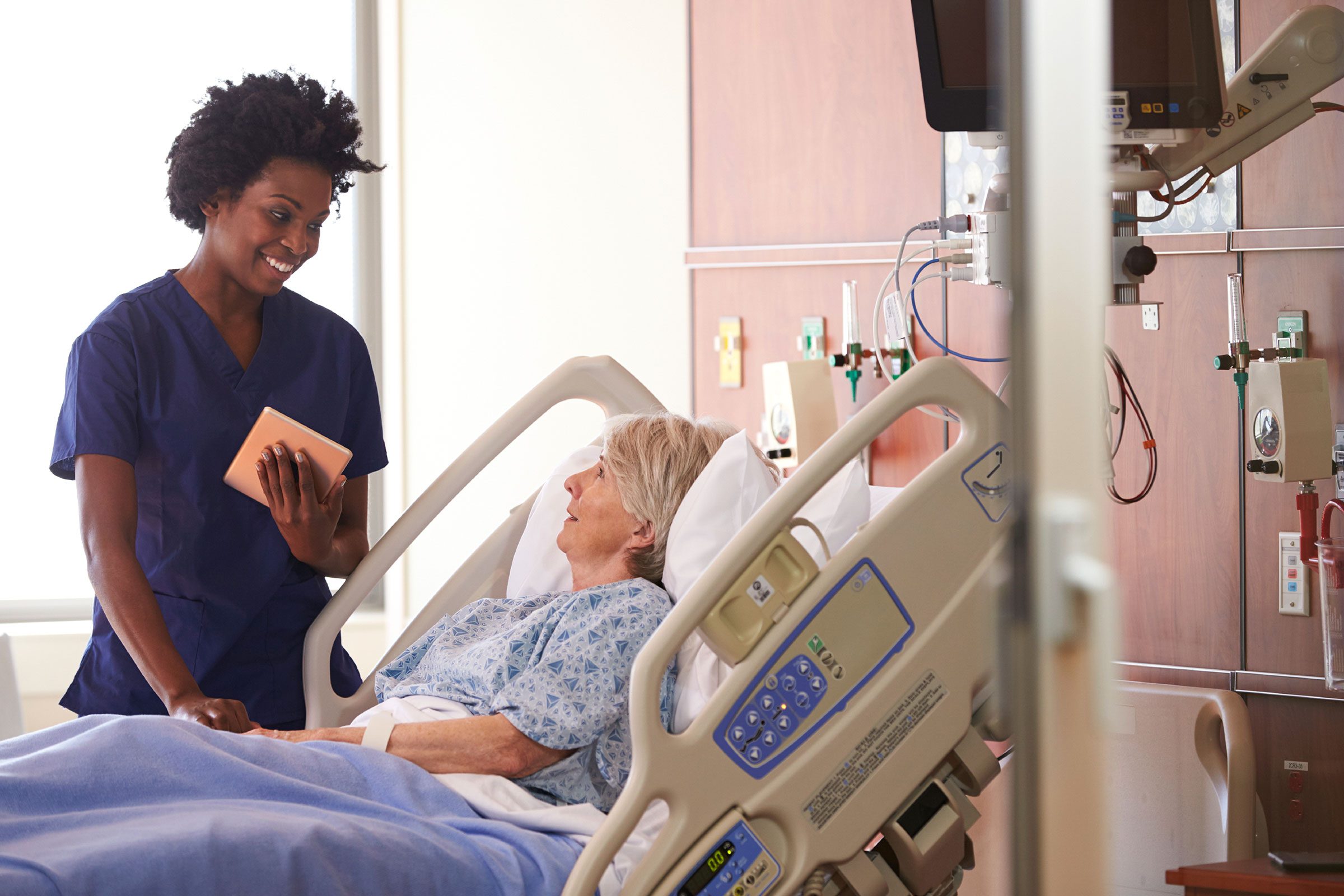 ISTOCK/MONKEYBUSINESSIMAGES
ISTOCK/MONKEYBUSINESSIMAGES
"Some jobs are physically demanding. Some are mentally demanding. Some are emotionally demanding. Nursing is all three. If you have a problem with a nurse or with your care, ask to speak to the charge nurse [the one who oversees the shift]. If it isn't resolved at that level, ask for the hospital supervisor." —Nancy Brown, RN, a longtime nurse in Seattle
Demand their attention
 ISTOCK/SHOTSHARE
ISTOCK/SHOTSHARE
“Now that medical records are computerized, a lot of nurses or doctors read the screen while you’re trying to talk to them. If you feel like you’re not being heard, say, ‘I need your undivided attention for a moment.’” —Kristin Baird, RN
Never talk to a nurse while she’s getting your medications ready
 ISTOCK/WAVEBREAKMEDIA
ISTOCK/WAVEBREAKMEDIA
"The more conversation there is, the more potential [there is] for error." —Linda Bell, RN
Nurses shouldn't miss your vein
 ISTOCK/ROIBU
ISTOCK/ROIBU
"If the person drawing your blood misses your vein the first time, ask for someone else. I've seen one person stick someone three times. They need to practice, but it shouldn't be on you!" —Karon White Gibson, RN, producer-host of Outspoken with Karon, a Chicago cable TV show
Never let your pain get out of control
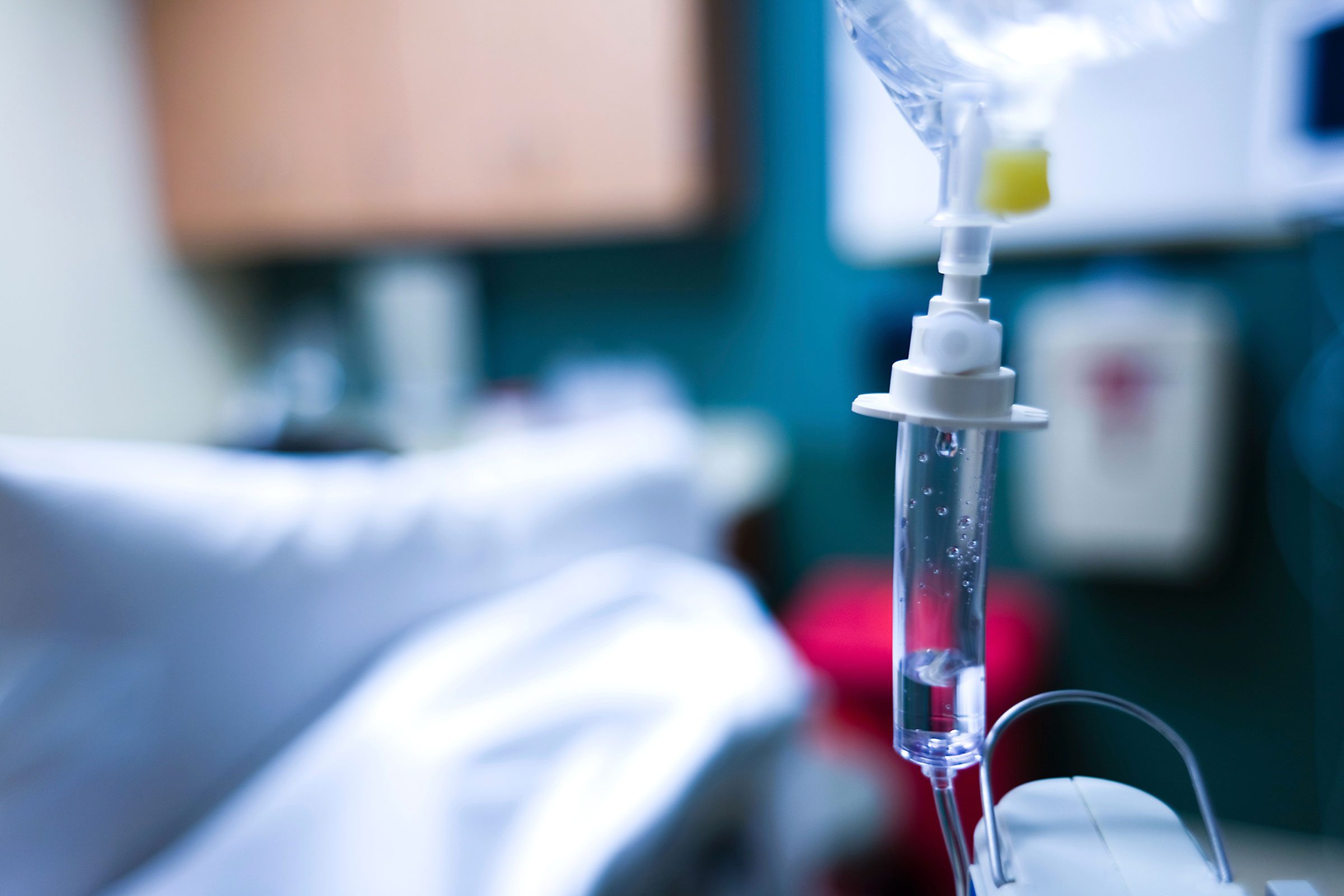 ISTOCK/SLOBO
ISTOCK/SLOBO
"Using a scale of zero to ten, with ten being the worst pain you can imagine, start asking for medication when your pain gets to a four. If you let it get really bad, it’s more difficult to get it under control." —Nancy Beck, RN, a nurse at a Missouri hospital. These are the secrets pain doctors won't tell you.
Drink lots of water before having your blood drawn
 ISTOCK/LOVEISCHIANGRAI
ISTOCK/LOVEISCHIANGRAI
"If you're going to get blood drawn, drink two or three glasses of water beforehand. If you're dehydrated, it’s a lot harder for us to find a vein, which means more poking with the needle." —Mary Pat Aust, RN, clinical practice specialist at American Association of Critical-Care Nurses in Aliso Viejo, California
Don't hold your breath before a painful procedure
 ISTOCK/JEEP5D
ISTOCK/JEEP5D
"Don't hold your breath when you know we're about to do something painful, like remove a tube or take the staples out of an incision. Doing that will just make it worse. Take a few deep breaths instead." —Mary Pat Aust, RN
Try to avoid hospitals in July
 ISTOCK/LAFLOR
ISTOCK/LAFLOR
"If you have a choice, don't go into the hospital in July. That's when the new crop of residents starts, and they're pretty clueless." —A nurse supervisor at a New Jersey hospital
Doctors don’t always tell you everything
 ISTOCK/LAFLOR
ISTOCK/LAFLOR
"They’ll be in the hallway saying, 'She has a very poor prognosis. There's nothing we can do.' Then they don't say that in the room. Sometimes I try to persuade them to be more up-front, but I don't always succeed." —Theresa Brown, RN. Learn what doctors are thinking (but won't say to your face).
Many doctors seem to have a lack of concern about pain
 ISTOCK/DINA2001
ISTOCK/DINA2001
"I've seen physicians perform very painful treatments without giving sedatives or pain medicine in advance, so the patient wakes up in agony. When they do order pain medicine, they're so concerned about overdosing, they often end up underdosing." —A nurse supervisor at a New Jersey hospital
Always ask anyone who comes into your room if they've washed their hands
 ISTOCK/ROBERTPRZYBYSZ
ISTOCK/ROBERTPRZYBYSZ
"There are a few doctors at every hospital who just don't think that they need to wash their hands between seeing patients. Others get distracted and forget. So always ask anyone who comes into your room, 'Have you washed your hands?'" —Kathy Stephens Williams, RN. And make sure you don't make these hand-washing mistakes yourself, either.
Please give physical affection to dying loved ones
 ISTOCK/KATARZYNABIALASIEWICZ
ISTOCK/KATARZYNABIALASIEWICZ
"When you're with someone who is dying, try to get in bed and snuggle with them. Often they feel very alone and just want to be touched. Many times my patients will tell me, 'I'm living with cancer but dying from lack of affection.'" —Barbara Dehn, RN, NP. Here are some other things you should never do while visiting someone in the hospital.
It’s the little things that make a difference for people who are sick
 ISTOCK/ILYAORESHKOV
ISTOCK/ILYAORESHKOV
"One of the best things you can do is wrap them in a warm blanket or towel. Throw the towel in the dryer before they are bathed. If they're in a hospital, find out where the blanket warmer is." —Barbara Dehn, RN, NP
I may talk to family members to clarify their goals for the patient’s care
 ISTOCK/PEOPLEIMAGES
ISTOCK/PEOPLEIMAGES
"I'll never tell you to change your code status to Do Not Resuscitate, even though I might cringe at the thought of having to break your ribs during CPR. With certain patients, however, I may talk to family members to clarify their goals for the patient's care. This sometimes leads to an elderly person being placed on comfort care rather than being continually tortured by us with procedures that aren't going to help." —A cardiac nurse in San Jose, California
The doctors don't save you; we do
 ISTOCK/MAPODILE
ISTOCK/MAPODILE
"We're the ones keeping an eye on your electrolytes, your fluids, whether you're running a fever. We're often the ones who decide whether you need a feeding tube or a central line for your IV. And we're the ones who yell and screech when something goes wrong." —A longtime nurse in Texas
Husbands, listen to your wives if they tell you to go to the hospital
 ISTOCK/JOSHUA HODGE PHOTOGRAPHY
ISTOCK/JOSHUA HODGE PHOTOGRAPHY
"Today a man kept fainting but wouldn't go to the hospital until his wife forced him. He needed not one, not two, but three units of blood—he was bleeding internally. He could have had a cardiac arrest. Another man complained to his wife that he didn’t feel 'right.' His wife finally called me to come over to their house. His pulse was 40. He got a pacemaker that evening." —Barbara Dehn, RN, NP. Here are some more mistakes you make that can lead to a misdiagnosis.
If you do not understand what the doctor is telling you, say so!
 ISTOCK/JOHNNY GREIG
ISTOCK/JOHNNY GREIG
"I once heard a doctor telling his patient that the tumor was benign, and the patient thought that benign meant that he had cancer. That patient was my dad. It was one of the things that inspired me to become a nurse." —Theresa Tomeo, RN, a nurse at the Beth Abraham Center for Nursing and Rehabilitation in Queens, New York. These are the medical facts that doctors and nurses want everyone to know.
At the end of an appointment, ask yourself: Do I know what’s happening next?
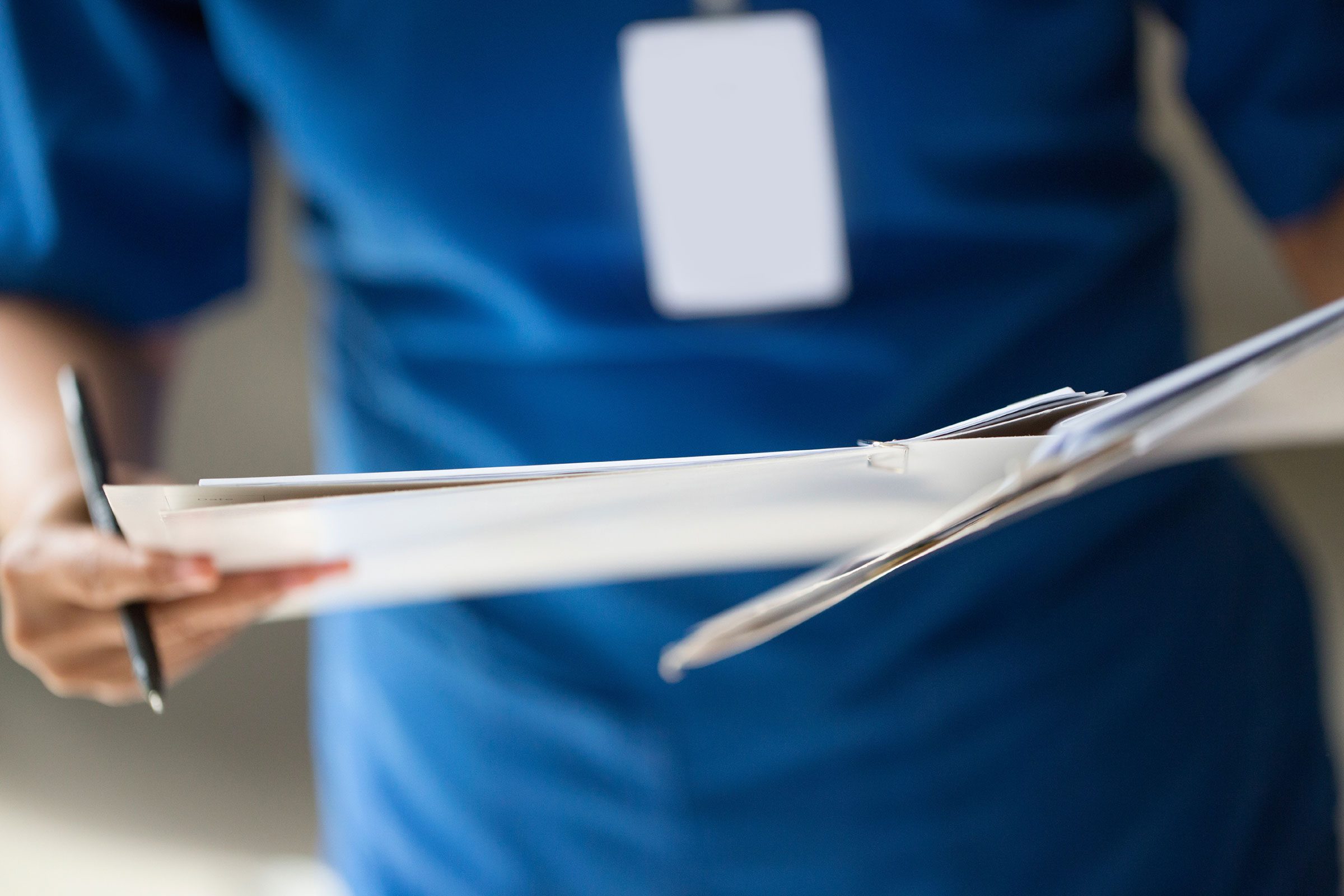 ISTOCK/SHOTSHARE
ISTOCK/SHOTSHARE
"If you had blood drawn, find out who's calling who with the results, and when. People assume that if they haven't heard from anyone, nothing is wrong. But I've heard horror stories. One positive biopsy sat under a pile of papers for three weeks." —Kristin Baird, RN
Sometimes you do nothing but run numbers and replenish fluids
 ISTOCK/FANGXIANUO
ISTOCK/FANGXIANUO
"Sometimes you're also the person who reassures the teenager that 'everybody' gets her period on the day of admission, the person who, though 30 years younger than the patient, tells that patient without blushing or stammering that yes, sex is possible even after neck surgery. You're the person who knows not only the various ways to save somebody else's life but also how to comfort those left behind." —A longtime nurse who blogs at head-nurse.blogspot.com
Know when to draw the line
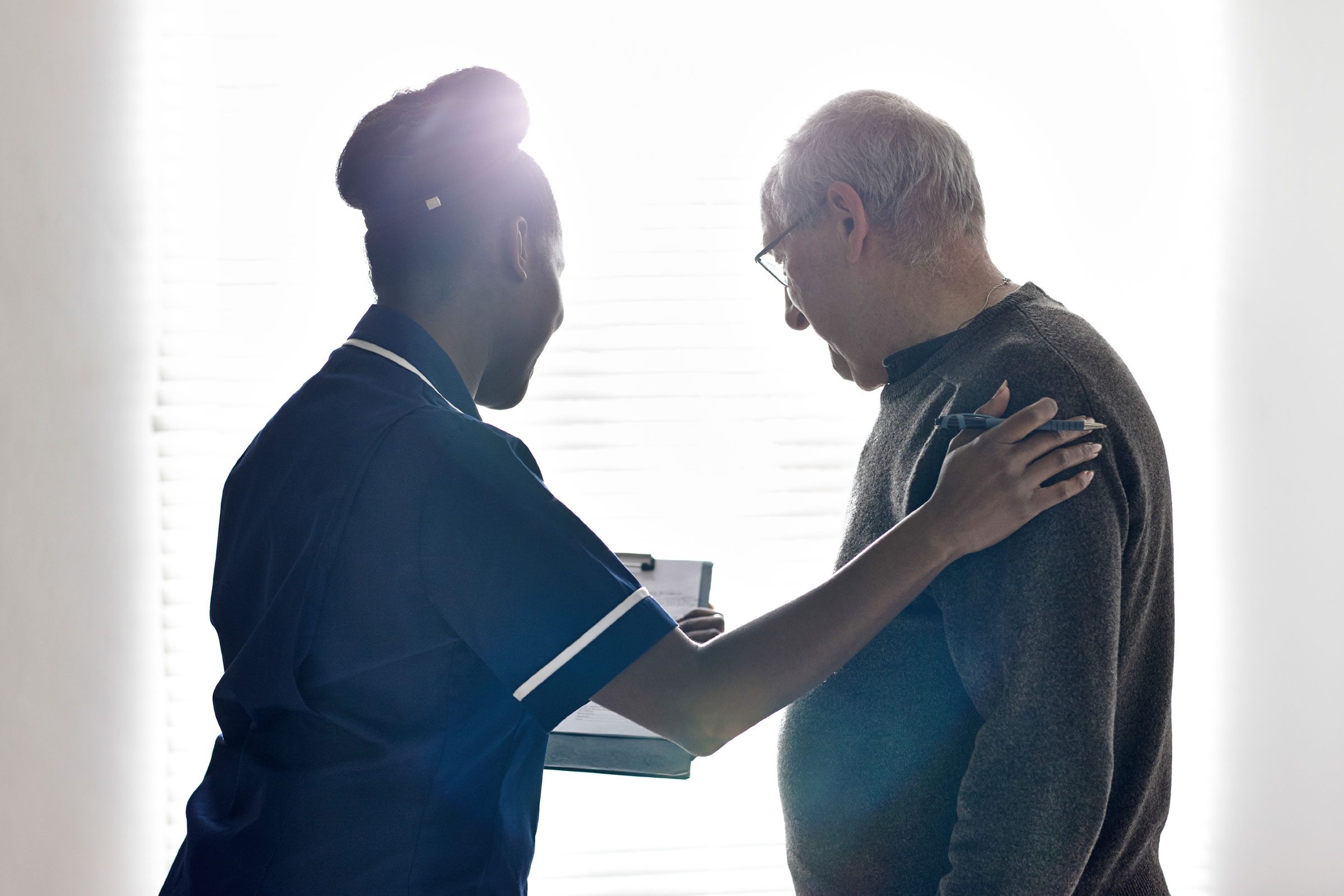 ISTOCK/DEAN MITCHELL
ISTOCK/DEAN MITCHELL
"I had one patient show up repeatedly to see me after he was discharged. Another little old man tried to pull me into bed with him. (He was stronger than he looked.) The general rule is don't ask us on a date. We're busy. It's unethical. And, really, I already know you better than I want to." —A longtime nurse in Texas
CONTENT CONTINUES BELOW AD
Stay positive
 ISTOCK/CHRISTOPHER FUTCHER
ISTOCK/CHRISTOPHER FUTCHER
"Positive attitude is everything. I have seen many people think themselves well." —Nancy Beck, RN
Say thank you
 ISTOCK/STEVE DEBENPORT
ISTOCK/STEVE DEBENPORT
"A simple 'Thank you' can really make my day." —A nurse in New York City
I don't believe you when you tell me how much you drink
 ISTOCK/MMEEMIL
ISTOCK/MMEEMIL
"When you tell me how much you drink or smoke or how often you do drugs, I automatically double or triple it." —A longtime nurse in Texas. These are the 14 things you should never lie to your doctor about.
I don't have time to wait on you
 ISTOCK/JONATHAN DOWNEY
ISTOCK/JONATHAN DOWNEY
"I know you asked for mashed potatoes, but that sound you hear is my other patient's ventilator going off." —A nurse in New York City
Sometimes I have to lie
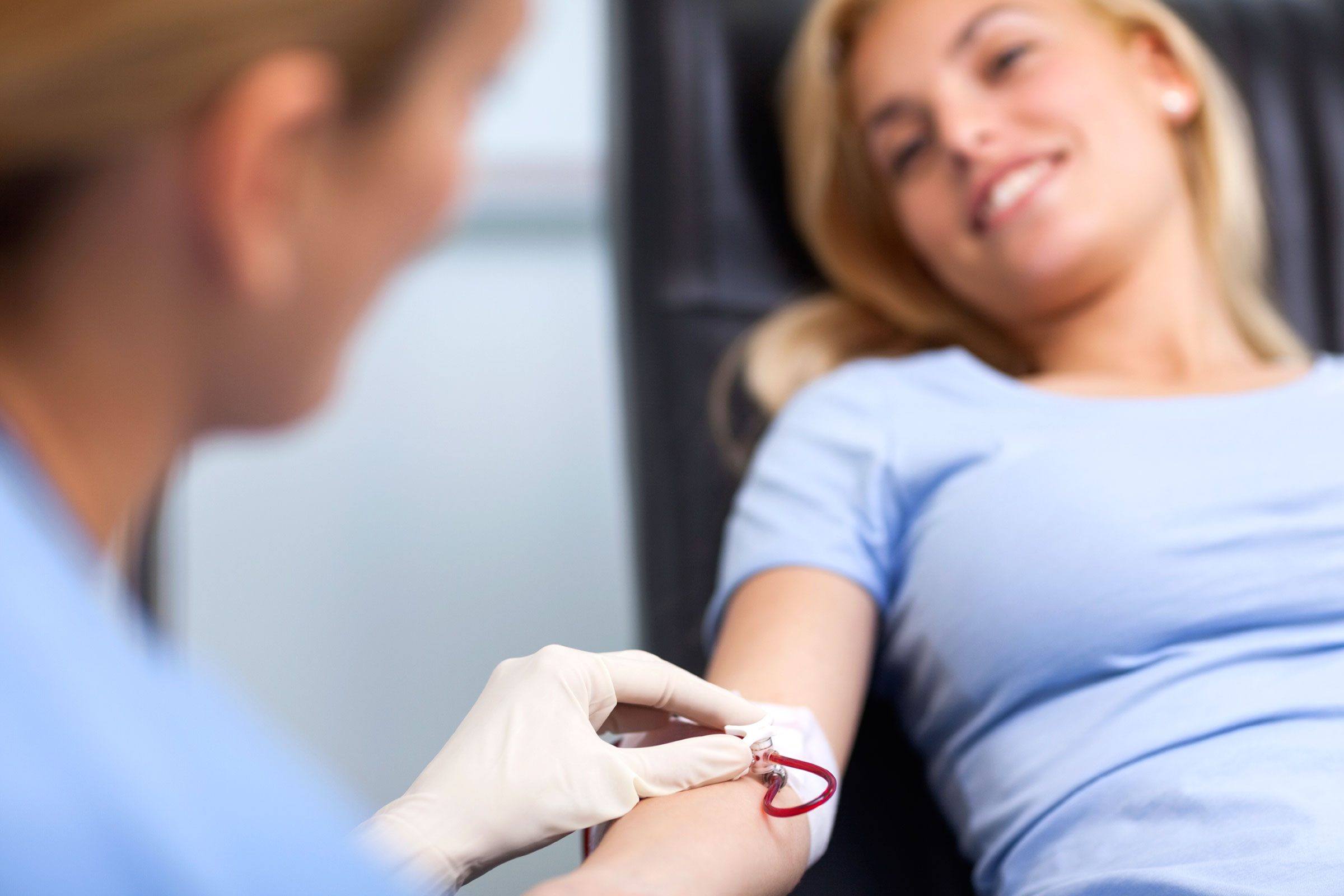 ISTOCK/WAVEBREAK
ISTOCK/WAVEBREAK
"When you ask me, 'Have you ever done this before?' I'll always say yes. Even if I haven't." —A nurse in New York City
Try this trick
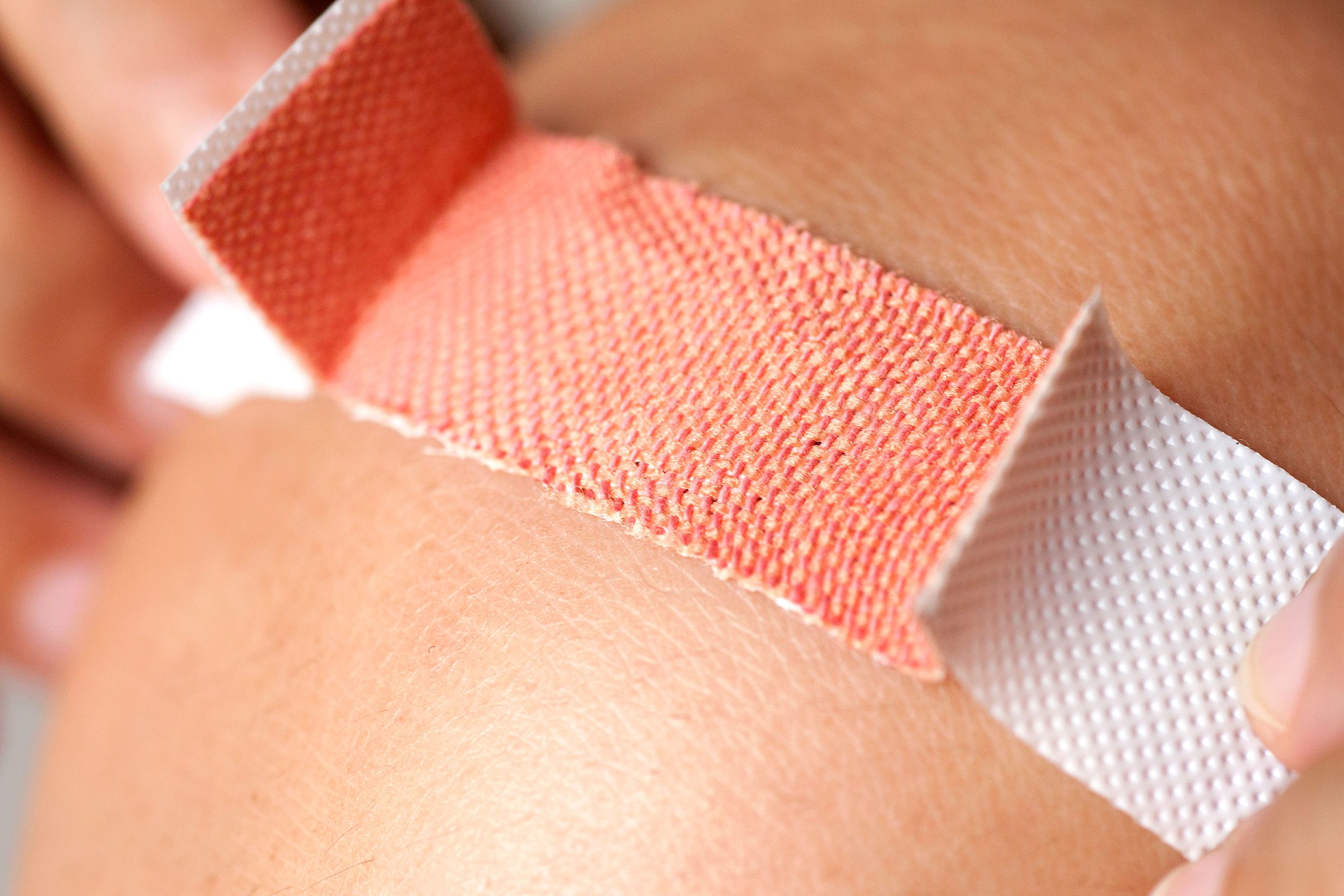 ISTOCK/TANAWATPONTCHOUR
ISTOCK/TANAWATPONTCHOUR
"Ask the nurse to wet your bandage or dressing before removal—it won't hurt as much." —Karen White Gibson, RN. Here are some more easy tips from doctors and nurses that will improve your hospital stay.
We can't talk to everyone
 DUXX/SHUTTERSTOCK
DUXX/SHUTTERSTOCK
“You might think that all the doctors who see you talk to each other, but they often don’t. That’s a problem because physicians sometimes disagree. The more you can keep track of different doctors’ opinions—and communicate them—the better off you’ll be.” –A nurse in Pennsylvania
Don't come for lunch
 TRATTIERITRATTI/SHUTTERSTOCK
TRATTIERITRATTI/SHUTTERSTOCK
“Don’t show up for a scheduled hospital admission at 12:30 p.m. and expect lunch. We’re not a hotel with room service and we can’t always turn around requests that quickly. Eat before you come, unless the doctor tells you not to.” –Theresa Brown, RN, an oncology nurse and the author of Critical Care: A New Nurse Faces Death, Life and Everything in Between
Know your symptoms
 KLEBER CORDEIRO/SHUTTERSTOCK
KLEBER CORDEIRO/SHUTTERSTOCK
“To get a faster diagnosis, know your symptoms and what makes them worse. If you’re having chest pains, is it worse when you take a deep breath? What about when you press on your chest?” –Nancy Beck, RN, a nurse at a Missouri hospital
Know how to check glucose
 SYDA PRODUCTIONS/SHUTTERSTOCK
SYDA PRODUCTIONS/SHUTTERSTOCK
“If you’re diabetic and need to check your glucose frequently, don’t buy a glucometer—the gadget that measures your blood sugar. Some manufacturers will give you one for free if you know to ask, because they make more money on the test strips than they do on the machines. Just make sure your insurance plan covers the test strips for the glucometer you choose. If you’re paying out of pocket, check the price of the strips, not just the device.” –Theresa Tomeo, RN, a nurse at the Beth Abraham Center for Nursing and Rehabilitation in Queens, New York
Don't lie about your pain
 SPOTMATIK LTD/SHUTTERSTOCK
SPOTMATIK LTD/SHUTTERSTOCK
“For some reason, when I ask ‘Are you having pain?’ a lot of patients say no, even if they are. But I’ve found that if I say, ‘Are you uncomfortable?’ people are much more likely to say yes. Please tell us if you’re in pain. We have all sorts of medications we can use to help you.”–Mary Pat Aust, RN, clinical practice specialist at American Association of Critical-Care Nurses in Aliso Viejo, California. Here are some questions you should always ask before you take pain medication.
Say "I love you"
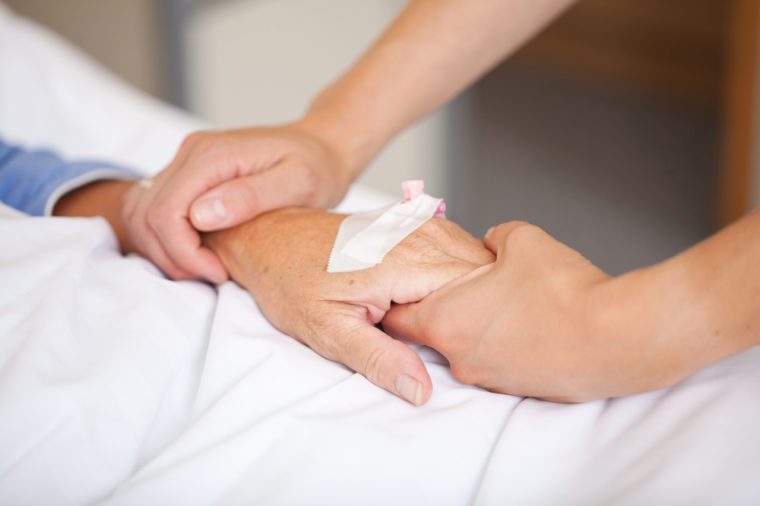 STOCKFOUR/SHUTTERSTOCK
STOCKFOUR/SHUTTERSTOCK
“When someone you love is dying, you can never say ‘I love you’ too much.” –Barbara Dehn, RN, a women’s health nurse practitioner in Silicon Valley who blogs at nursebarb.com.
Fresh air works wonders
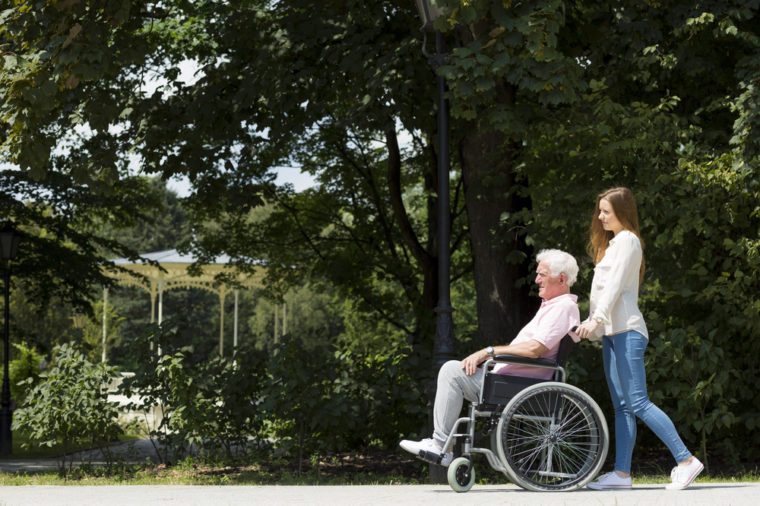 PHOTOGRAPHEE.EU/SHUTTERSTOCK
PHOTOGRAPHEE.EU/SHUTTERSTOCK
“I once had a patient who had been in ICU for six months. He was totally withdrawn—wouldn’t look at us, talk to us, or even open his eyes. One day, the doctor said, ‘Why don’t you take him outside?’ We were thinking, ‘Man, that’s a lot of work,’ but of course we said okay. We rolled his bed out the door, thinking what a waste of time it was. Well, the wind was on his face, he could hear the birds, and suddenly he opened his eyes and talked to his wife for the first time in months. That was an incredible day.” –Gina Rybolt, RN, an intensive care nurse in California who blogs at codeblog.com
Prep the day before
 ANDREW RAFALSKY/SHUTTERSTOCK
ANDREW RAFALSKY/SHUTTERSTOCK
“One of the things people hate most about having a colonoscopy is drinking the solution that triggers diarrhea to clean you out. But if you mix the prep the day before and place it in the fridge, it will be a lot easier to get down.” –Theresa Tomeo, RN, a nurse at the Beth Abraham Center for Nursing and Rehabilitation in Queens, New York
Your vitals are important
 ANDREY_POPOV/SHUTTERSTOCK
ANDREY_POPOV/SHUTTERSTOCK
“We know you hate being woken up, but we have to check your vital signs every four hours. It’s not the Hilton, it’s a hospital. And that’s hospital policy.” –A nurse in St. Petersburg, Florida
Use a pill planner
 WHYFRAME/SHUTTERSTOCK
WHYFRAME/SHUTTERSTOCK
“You might think you’re taking all of your pills, but a lot of you are missing one or two or all of your pills on a given day. Use a weekly pill planner.” –Theresa Tomeo, RN, a nurse at the Beth Abraham Center for Nursing and Rehabilitation in Queens, New York
Some doctors smoke
 YAKOBCHUK VIACHESLAV/SHUTTERSTOCK
YAKOBCHUK VIACHESLAV/SHUTTERSTOCK
“Some doctors tell people not to smoke, then sneak a cigarette outside.” –Karon White Gibson, RN, producer-host of Outspoken with Karon, a Chicago cable TV show. These are the stroke symptoms you should never ignore.
Ask if you can call back
 S_L/SHUTTERSTOCK
S_L/SHUTTERSTOCK
“When someone you care about is in the hospital and you call in for information, sometimes it’s not a good time for me to have a 10-minute conversation. Ask me first if I can call you back. That way, I can talk to you after I’ve collected my thoughts—and when I’m not thinking about another patient who’s throwing up.” –Theresa Brown, RN, an oncology nurse and the author of Critical Care: A New Nurse Faces Death, Life and Everything in Between.
Ask the nurse for recommendations
“If the doctor gives you names of three different specialists, ask the nurse which doctor she would choose to take care of her own child.” –Karon White Gibson, RN, producer-host of Outspoken with Karon, a Chicago cable TV show
Don't have me call your doctor
 SYDA PRODUCTIONS/SHUTTERSTOCK
SYDA PRODUCTIONS/SHUTTERSTOCK
“Before you demand that I call your doctor, understand what you’re asking. It’s not like you can just place a pleasant little phone call. You have to call their answering service and get them to call you back. Inevitably, you’re in another room when they call. Then when you finally talk to them, a lot of them are complete jerks, especially if you wake them up.” –A nurse in St. Petersburg, Florida
We investigate
 JACOB LUND/SHUTTERSTOCK
JACOB LUND/SHUTTERSTOCK
“I don’t know if we’re making more mistakes now or if we’re just tracking them better. It used to be if a patient came in the hospital and developed pneumonia, the attitude was ‘That just happens.’ Now, if they get pneumonia, we ask, ‘How did that happen?’ and we investigate.” –Kathy Stephens William, RN, staff development educator for critical care at St. Anthony’s Medical Center in St. Louis, Missouri
Bother the nurse
 JACOB LUND/SHUTTERSTOCK
JACOB LUND/SHUTTERSTOCK
“My biggest piece of advice: Bother the nurse. When I come upon patients who are in a lot of pain, I’ll ask, ‘Why didn’t you ask the nurse for your pain medication?’ and they say, ‘She looked so busy. I didn’t want to bother her.’ Please, ‘bother’ your nurse. She can’t help you if she doesn’t know what you need.” –Nurse supervisor at a New Jersey hospital
Ask us to translate
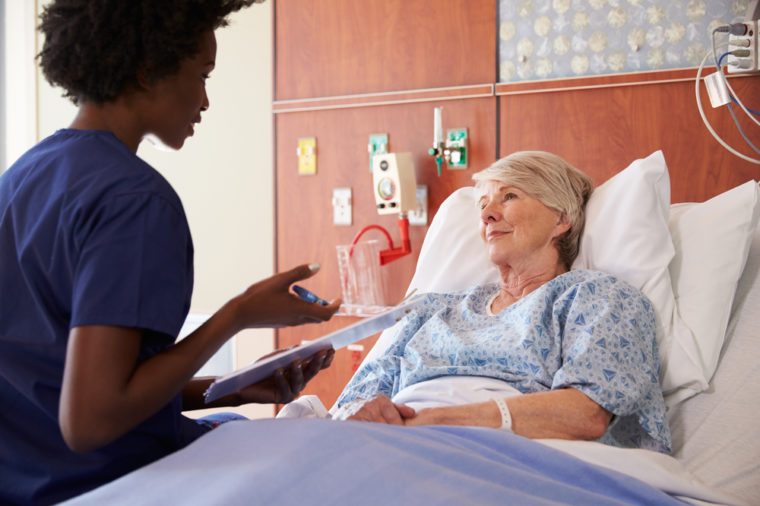 MONKEY BUSINESS IMAGES/SHUTTERSTOCK
MONKEY BUSINESS IMAGES/SHUTTERSTOCK
“If your doctor uses a lot of medical jargon and you don’t understand what it means, ask me to help translate—that’s part of our job.” –Theresa Brown, RN, an oncology nurse and the author of Critical Care: A New Nurse Faces Death, Life and Everything in Between. If you want to figure it out on your own, here are the definitions of the outrageous medical jargon doctors and nurses use.
Tell us about money problems
 LTIM/SHUTTERSTOCK
LTIM/SHUTTERSTOCK
“If you can’t afford your medication, tell us. Your doctor may have other, less expensive ways to keep you healthy, or we may be able to connect you to resources that can help.” –Nancy Beck, RN, a nurse at a Missouri hospital
Keep comfort in mind
 DMYTRO ZINKEVYCH/SHUTTERSTOCK
DMYTRO ZINKEVYCH/SHUTTERSTOCK
“When it comes to very elderly patients, sometimes family members who are afraid of seeing Mom or Dad go will want us to run a lot of tests or do a major surgery—when, really, the elderly patient just wants to be comfortable. If you’re the older patient, be sure your nurse and your doctors know what you want.” –Nancy Beck, RN, a nurse at a Missouri hospital
Don't blame us for being late
 NIKITA SAVOSTIKOV/SHUTTERSTOCK
NIKITA SAVOSTIKOV/SHUTTERSTOCK
“Please don’t get mad at me because your scan was supposed to be at noon and you didn’t have it until 3. Unfortunately, I have no control over that.” –Theresa Brown, RN, an oncology nurse and the author of Critical Care: A New Nurse Faces Death, Life and Everything in Between
Be patient
 IRENAPHOTO/SHUTTERSTOCK
IRENAPHOTO/SHUTTERSTOCK
“Expect to get pain medication about 10 minutes after your request. If I am not there, simply call back.” –Nancy Beck, RN, a nurse at a Missouri hospital. Learn about how a positive attitude can influence your health.
Let us know about your family
 WAVEBREAKMEDIA/SHUTTERSTOCK
WAVEBREAKMEDIA/SHUTTERSTOCK
“If you think your family member is confused, let us know. That tells us we should move them closer to the nurses’ desk and check in on them more frequently. We’ll also attach an alarm to their gown so we know if they’re getting up without assistance.” –Nancy Beck, RN, a nurse at a Missouri hospital
Don't bring your medication with you
 JD-MEDIA/SHUTTERSTOCK
JD-MEDIA/SHUTTERSTOCK
“I understand why you want to bring your own medication to the hospital: It probably costs $10 in the hospital and 3 cents at the drugstore. But please, don’t do it. Under our regulations, it’s not allowed. We need to know everything that’s going into your system.” –Mary Pat Aust, RN, clinical practice specialist at American Association of Critical-Care Nurses in Aliso Viejo, Ca.
Tell them to take deep breaths
 SYDA PRODUCTIONS/SHUTTERSTOCK
SYDA PRODUCTIONS/SHUTTERSTOCK
“In an emergency, the person who needs assistance is usually hyperventilating. So when you jump in to help, the first thing you should do is tell them to look you in the eye and take some slow, deep breaths. You’ll sound and act like an expert, and it will help everyone focus.” –Barbara Dehn, RN, a nurse practitioner in Silicon Valley who blogs at nursebarb.com
Hygiene doesn't always take priority
 ROBERATEN/SHUTTERSTOCK
ROBERATEN/SHUTTERSTOCK
“Trust me: I want to give your mother a bath, but sometimes I’m too busy trying to keep people alive. Hygiene is important, but when you have people who aren’t breathing well, that has to take priority.” –Theresa Brown, RN, an oncology nurse and the author of Critical Care: A New Nurse Faces Death, Life and Everything in Between. Next, check out this story of the rarest conditions doctors have ever diagnosed.
- লিঙ্ক পান
- X
- ইমেল
- অন্যান্য অ্যাপ

মন্তব্যসমূহ
একটি মন্তব্য পোস্ট করুন